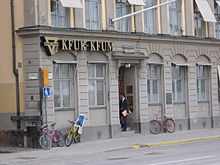| KFUK-KFUM Sverige | |
 | |
| Formation | 1966 (1966) |
|---|---|
| Type | Christian youth organization |
| Headquarters | Skeppsbron 28, Stockholm, Sweden |
| Methods |
|
| Membership | 60,000 |
| Official language | Swedish |
| Chairperson | Emma Hundertmark |
| General Secretary | Alexander Clemenson |
| Website | kfum |

The YWCA-YMCA of Sweden (Swedish: KFUK-KFUM Sverige) is the Swedish branch of the YMCA and the YWCA. It was established in 1966 following a merger of the formerly separate YMCA of Sweden and the YWCA of Sweden, which were originally founded in 1884 and 1885 respectively.
In 2011, the organization decided to use the term KFUM Sverige during promotion where M now stands for människor ("people") instead of män (men) as before.
The YWCA-YMCA of Sweden has 40,000 members in 140 local associations. Several Swedish YWCA-YMCA associations have been successful in sport.
References
- ^ "Kontakt" (in Swedish). Stockholm: YWCA-YMCA of Sweden. Retrieved 13 January 2021.
- "Historia" [History] (in Swedish). Stockholm: YWCA-YMCA of Sweden. Retrieved 14 November 2018.
- "KFUK-KFUM Sveriges Riksombudsmöte i Umeå, 29–30 oktober 2011" (PDF) (in Swedish). Stockholm: YWCA-YMCA of Sweden. Retrieved 5 March 2012.
- "Organisation" [Organization] (in Swedish). Stockholm: YWCA-YMCA of Sweden. Retrieved 14 November 2018.
External links
- Official website
 (in Swedish)
(in Swedish)
| Christianity in Sweden | |
|---|---|
| Denominations | |
| Interdenominational organisations | |
| Former denominations | |
| Church buildings | |
| Youth organisations | |
| Christian-influenced politics | |
| Development agencies | |
| Traditions | |
| |